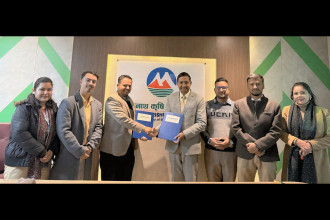KATHMANDU: The National Seminar on Promoting and Ensuring Permeability in the Education System of Nepal, which took place on January 17 in Kathmandu, concluded successfully. The seminar marked a milestone in understanding international experiences and advancing discussions on contextualising permeability in Nepal's education system.
The Council for Technical Education and Vocational Training (CTEVT)/National Skill Testing Board (NSTB) organised the seminar in collaboration with the Ministry of Education, Science and Technology (MoEST). The Nepal Vocational Qualifications System Project – Phase II (NVQS P-II), a joint initiative between the Swiss and Nepali governments, supported the seminar. NVQS P-II assists the CTEVT in implementing the National Vocational Qualifications Framework (NVQF), which the Government of Nepal approved on May 20, 2020. The NVQF is a comprehensive national framework for certifying individuals' skills and competencies acquired through training or practical experiences, enabling them to access higher-level skills and enter national and international labour markets for better earnings.
The seminar featured distinguished speakers and experts who provided valuable perspectives on international experiences on permeable education systems and the urgency of a permeable education system (basic, higher and TVET system) in Nepal.
The seminar began with a welcome address by Tek Bahadur Malla, NSTB Director. Prof Dr Ursula Renold from ETH Zurich, made a presentation on the importance of a robust technical and vocational education and training (TVET) system for boosting youth employment and economic development. She emphasized creating clear paths for TVET graduates, from diplomas to higher levels, to attract talented individuals to this career path. She shared global best practices and suggested ideas for Nepal to consider.
Dr Anoj Bhattarai, CTEVT Director of Curriculum and Equivalence Division, discussed ongoing efforts to implement a credit accumulation and transfer (CAT) system in the TVET sector in his presentation. This system involves completing a National Technical Certificate in two years, with an additional year leading to a National Diploma. Students receive module certificates with defined credits, allowing them to enter the job market and return to TVET schools for further education at any time.
At the programme, MoEST Joint Secretary Shree Prasad Bhattarai, and Under Secretary Raju Shrestha made their presentation. Their presentation outlined higher education efforts aligned with the National Qualification Framework. The fourth and final presentation from Nilkantha Dhakal, Director of Center for Education and Human Resource Development (CEHRD), shared progress in non-formal and alternative education, focusing on Recognition of Prior Learning (RPL) to help individuals attain general education qualifications.
The event highlighted continuous efforts in implementing the NVQF, by designing and implementing TVET courses at a higher level (NVQ Level 6 and above) in line with NVQF to provide an attractive progression pathway to the young people in the country.
Following the presentations on different aspects of 'permeability' by the presenters, guided discussions with facilitators and presenters as panel members took centre stage, allowing for interactive and insightful exchanges. The panel discussion was facilitated by Subas Subedi, Team Leader for NVQS-P.
Shiva Kumar Sapkota, Joint Secretary of TVET Division, and Ima Narayan Shrestha, Joint Secretary of the Planning Division, both from the MoEST, shared their remarks. The Vice-Chairperson of CTEVT, Khagendra Adhikari, provided concluding remarks.
The seminar was attended by over 70 key stakeholders, experts, policymakers, and representatives from various sectors. Distinguished attendees included the Vice-Chairperson and Member Secretary from CTEVT, joint secretaries from ministries, representatives from higher education, executive directors, and directors from TITI and CTEVT, sector skills committees, representatives from Kathmandu University (KU), MoEST, CEHRD, National Examination Board, professional councils, business chambers, and development partners such as SDC, EU, Norway, Germany, World Bank, and Asian Development Bank.
The successful conclusion of the seminar highlights the commitment of stakeholders to enhancing education permeability in Nepal, creating a dynamic and collaborative environment for future initiatives.






-1766135582.jpeg)